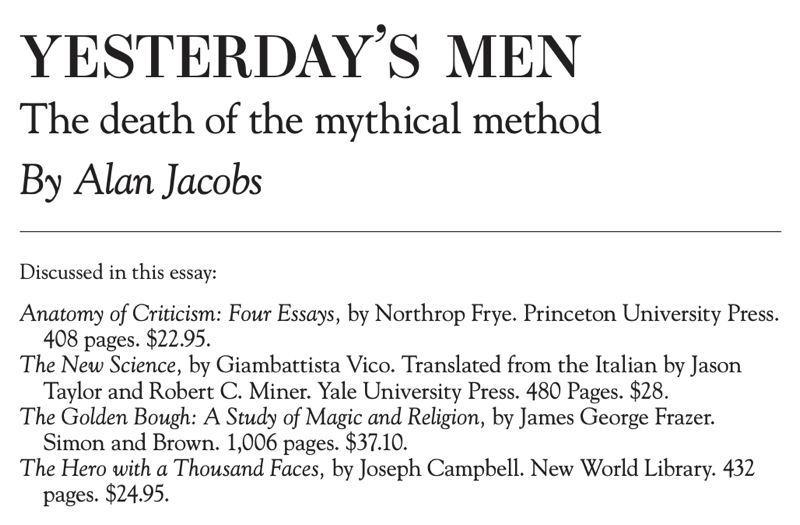
Next month I have an essay coming out in Harper’s called “Yesterday’s Men: The Death of the Mythical Method.” In it I look at the rise — a rise that started a looong time ago — of myth as the central category of discourse among poets, novelists, and humanities scholars; and then I look at the rapid decline of that category and its replacement by others. (Spoiler: the replacement categories are, mainly, overtly political.) Then, near the end, I ask whether “the mythical method” — a line I borrow from T. S. Eliot — has any literary future.
But along the way I also talk about the places where the language of myth and archetype still survives, and even thrives: in movies, for instance, and in many forms of what academics call “genre fiction.” A form of discourse, a vocabulary, a set of terms and images, might be passé in the academy without having lost its power elsewhere. (A fact that academics try not to notice.)
And here’s another implication of my essay, one which I have only since writing it become aware of: If, as celebrants from Vico to Northrop Frye and Joseph Campbell have said, myths and archetypes are deeply and pervasively embedded in all our cultural productions — and pause for a moment to reflect on the enormous significance of this — then, per necessitatem, they are also deeply embedded in our large language models. Which means, first, that GAI endeavors will be thoroughly shaped by those myths and archetypes; and second, that if human beings are able to create artificial general intelligence, if the Singularity really does happen, then it will be foundationally constituted by those very myths and archetypes.
Had you thought of that possibility? I hadn’t … until I read Robin Sloan’s delightful soon-forthcoming novel Moonbound, whose own spectacular narrative is generated by the double thought that (a) human beings are creatures made of myths and (b) whatever succeeds us twelve thousand years from now — however strange to us, and whether biological or digital or both — will be made of the same myths.
Put that in your pipe and smoke it. I’m having a nice long toke even as I write.
P.S. If you want to get a little deeper in the weeds re: AI and myths, read this characteristically smart post by Samuel Arbesman.